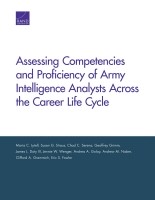| 来源类型 | Research Reports
|
| 规范类型 | 报告
|
| DOI | https://doi.org/10.7249/RR1851
|
| ISBN | 9780833097538
|
| 来源ID | RR-1851-A
|
| Assessing Competencies and Proficiency of Army Intelligence Analysts Across the Career Life Cycle |
| Maria C. Lytell; Susan G. Straus; Chad C. Serena; Geoffrey E. Grimm; James L. Doty III; Jennie W. Wenger; Andrea A. Golay; Andrew M. Naber; Clifford A. Grammich; Eric S. Fowler
|
| 发表日期 | 2017
|
| 出版年 | 2017
|
| 页码 | 116
|
| 语种 | 英语
|
| 结论 |
35F Analysts Require a Range of Cognitive and Noncognitive Competencies- Critical competencies for 35F analysts include general mental ability, critical thinking skills, problem-solving skills, domain knowledge, communication skills, adaptability, open-mindedness, and conscientiousness.
- A range of established tests and surveys can be used to assess competencies and proficiency of 35F analysts.
General Mental Ability and Conscientiousness Are Key Predictors of Proficiency in Training- 35F analysts with greater general mental ability than other analysts and who were more conscientious than other analysts had higher grade-point averages and higher odds of graduating from initial skills training than other analysts had.
35F Analysts Show Similar Competencies at Different Stages in the Career Life Cycle and Generally Lack Sufficient Opportunities to Perform Analytic Work on the Job- Junior and midgrade analysts were similar in most competencies, but midgrade analysts demonstrated stronger critical thinking skills.
- Junior and midgrade analysts reported having few opportunities to perform military intelligence tasks on the job and reported proficiency on only about half of key analytic tasks.
Few Competencies Were Associated with Job Proficiency- Differences between junior and midgrade analysts on tests of job proficiency were mixed; however, scores were relatively low across groups, and few competencies predicted job proficiency. These findings could be a result of skill decay or low motivation to complete study assessments.
|
| 摘要 |
- Establish proficiency standards for analysts.
- Develop and implement instruments to assess proficiency.
- Provide analysts with sufficient opportunities to maintain and enhance their skills on the job.
- Modify resources to support changes to assessment and development policy.
- Expand on this study's findings in future research and practice by using alternative approaches to identifying key analytic competencies, assessing competencies not measured in the study, and addressing competencies for intelligence analysis conducted by teams.
|
| 主题 | Intelligence Analysis
; Military Career Field Management
; Military Intelligence
; Performance Measurement
; United States
|
| URL | https://www.rand.org/pubs/research_reports/RR1851.html
|
| 来源智库 | RAND Corporation (United States)
|
| 引用统计 |
|
| 资源类型 | 智库出版物
|
| 条目标识符 | http://119.78.100.153/handle/2XGU8XDN/108534
|
推荐引用方式
GB/T 7714 |
Maria C. Lytell,Susan G. Straus,Chad C. Serena,et al. Assessing Competencies and Proficiency of Army Intelligence Analysts Across the Career Life Cycle. 2017.
|
|
文件名:
|
x1501159779677.jpg
|
|
格式:
|
JPEG
|

|
文件名:
|
RAND_RR1851.pdf
|
|
格式:
|
Adobe PDF
|
除非特别说明,本系统中所有内容都受版权保护,并保留所有权利。